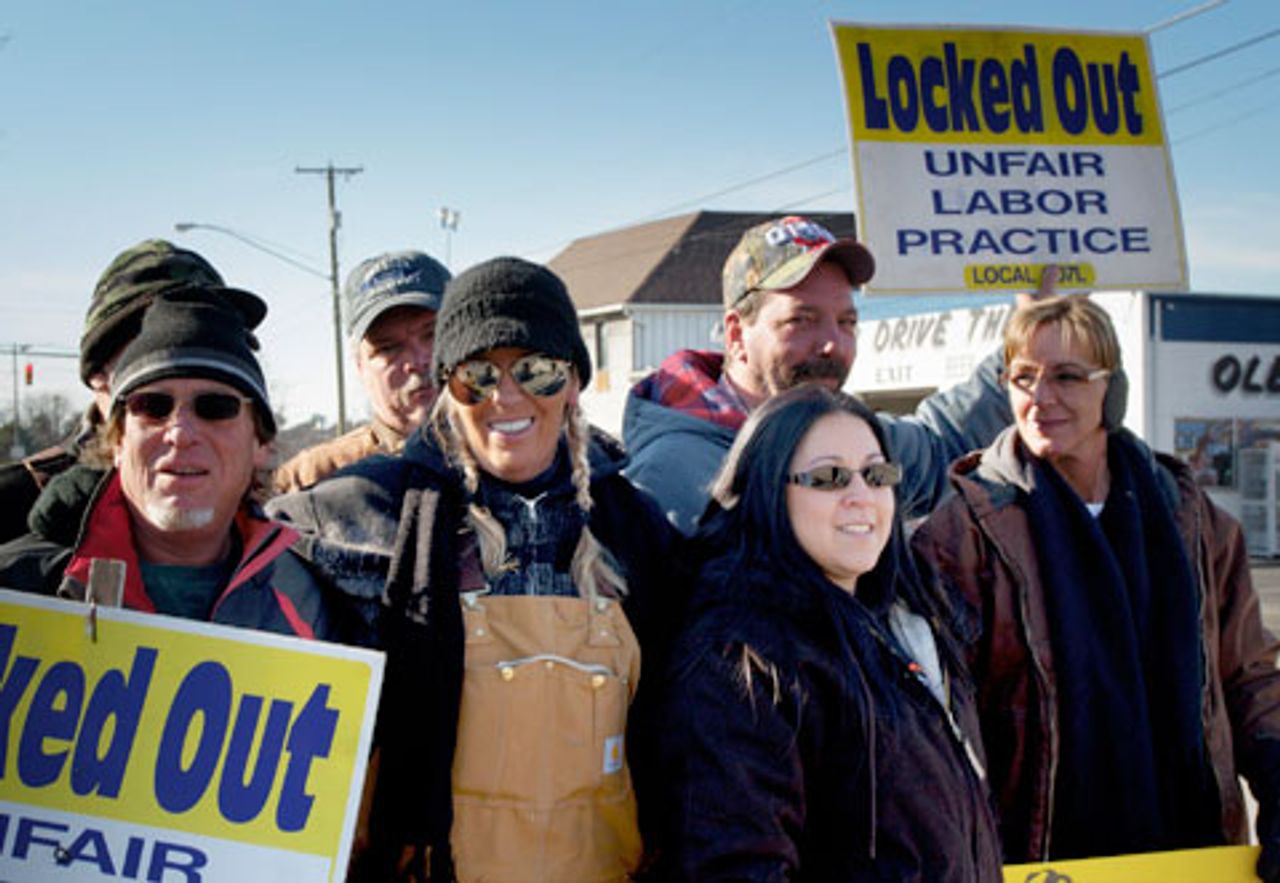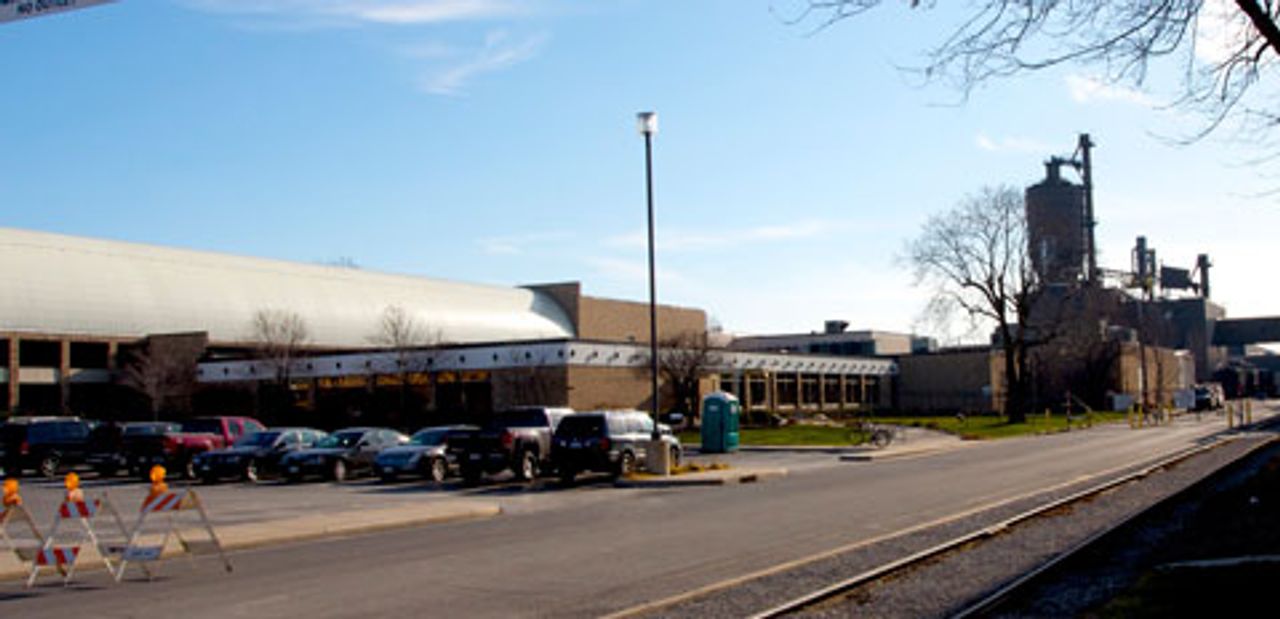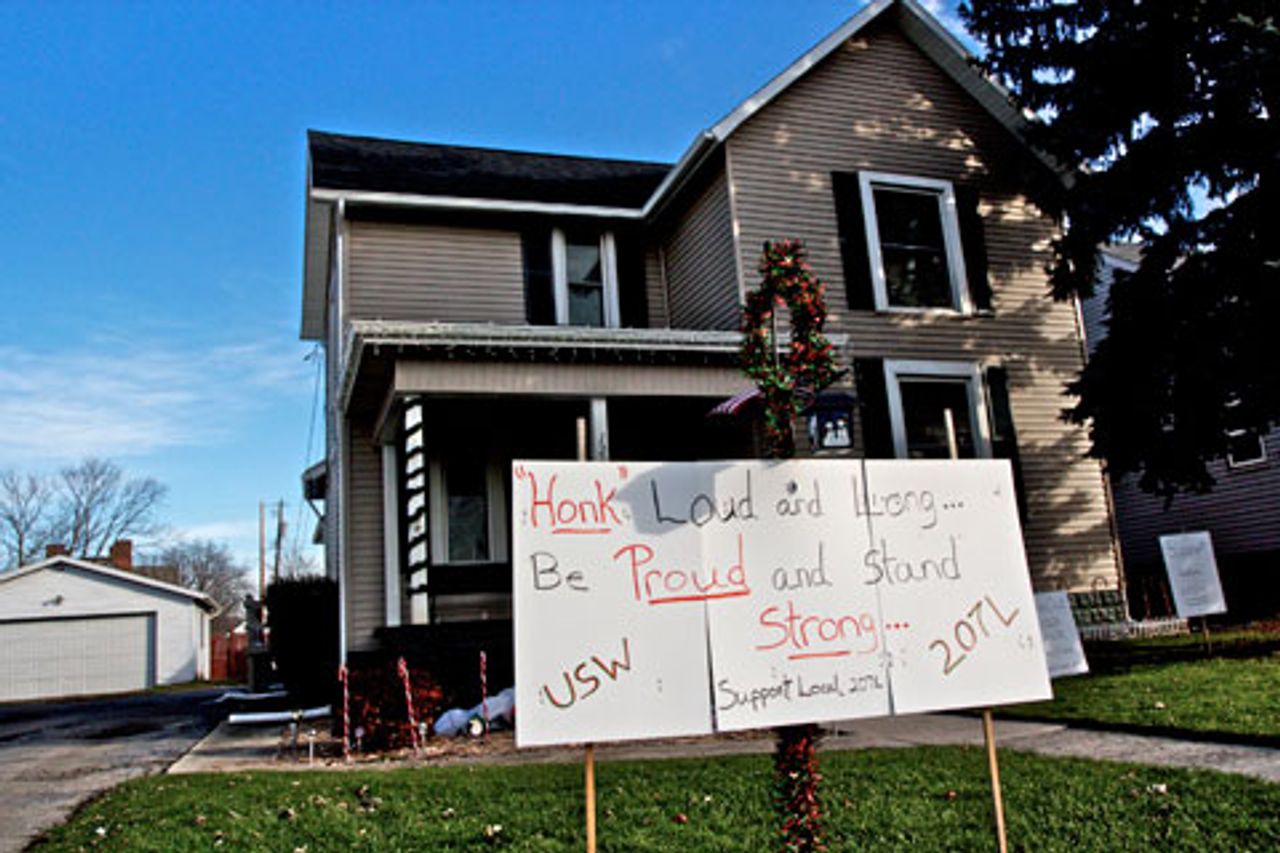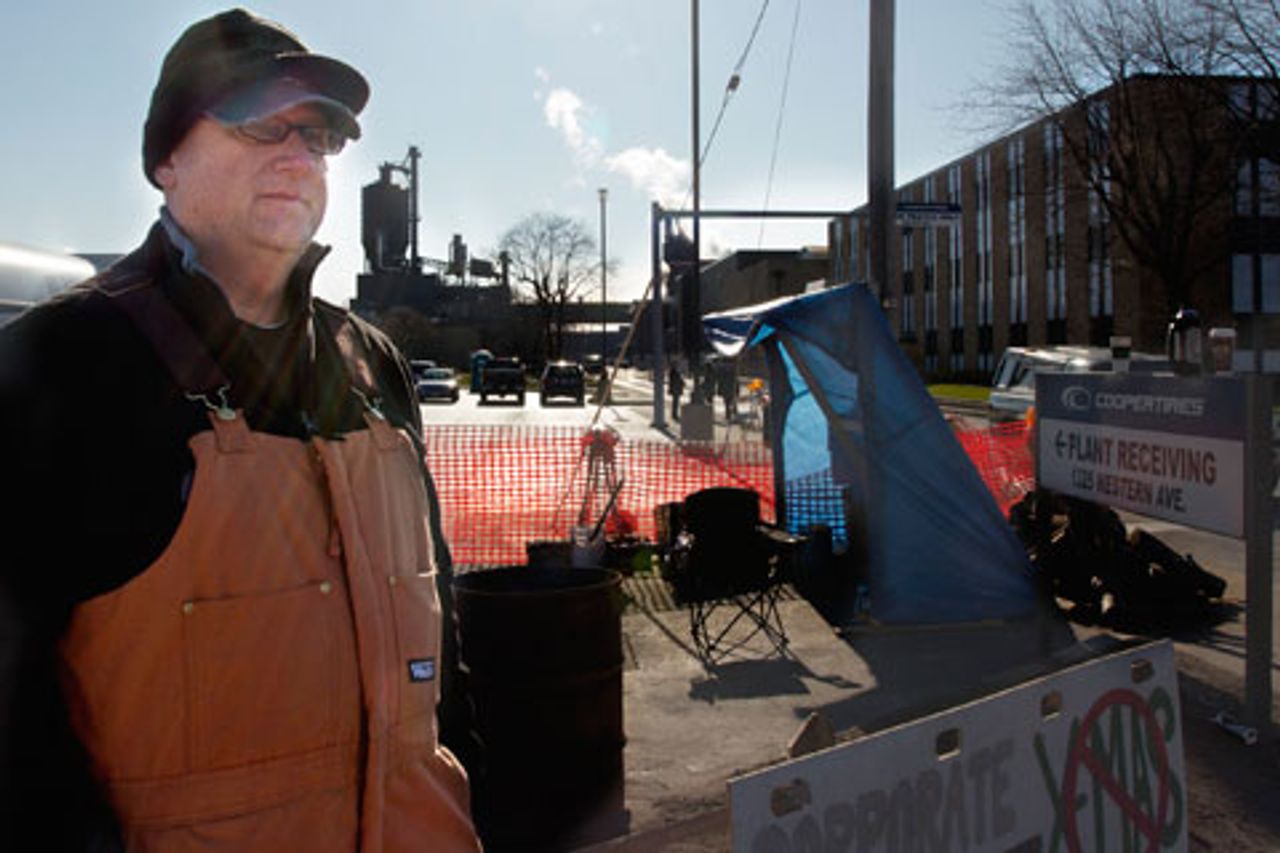 Denny Cole, Lori Miller, Jenna Lopez, and Trish Morger, flanked by their fellow workers, on the picket lines at the factory gates
Denny Cole, Lori Miller, Jenna Lopez, and Trish Morger, flanked by their fellow workers, on the picket lines at the factory gatesMore than a thousand workers are maintaining their picket lines at the Cooper Tire & Rubber Co. factory in Findlay, Ohio, two weeks after being locked out for opposing management’s attack on their wages and working conditions.
The mood of workers was defiant, and they expressed their determination to beat back the company’s plans to impose new, lower wages. The factory uses a piece-rate system that pays workers according to the number of tires they produce. Workers suspect management’s plan to ‘reevaluate’ production targets will be used to push them into lower-wage categories, resulting in pay cuts of 40 percent or more.
Three years ago, the United Steelworkers accepted steep concessions when the company threatened to shut the plant, including “tier-two” wages of $13 an hour for new-hires.
Rather than accepting more givebacks, workers are determined to recoup their losses from the company, which has fully recovered its profitability and awarded multimillion-dollar payouts to its top executives.
 The Cooper Tire factory
The Cooper Tire factory“In ’08 we gave up $10 million a year in concessions,” said Rick Raider, a worker with 22 years in the plant. “Now they’re making $150 million in profits. We don’t feel we should give up anything more. They keep taking and we’ve got to draw the line.
“A lot of us can’t afford to buy the tires we build, even with the employee discounts. They sell some of these tires for $300 each—that’s $1,200 altogether—and our own workers can’t buy them.
“They say they want new minimum standards for each job. In other words, if you don’t reach your production target they will kick you back to the entry-level wage. They want us to sign the contract first and accept that they will determine the quota later. It’s like buying a house and living in it for one year, before you know what the interest rate is going to be.”
Commenting on the wave of wage-cutting throughout the economy, Rick said, “When the government says 7,000 jobs have been created they don’t tell you they’re paying $8 or $9 an hour, not $30. Back in the 1950s a man could go to work and bring home enough money for his family to live on. Now both husband and wife are working, they are forced to leave their kids alone, and they’re still struggling.”
Jeanna Lopez, with 11 years at the company, described how management locked out workers on November 28. “We were off for Thanksgiving, and on the Monday we returned we were greeted by security guards at the gate at 6 a.m. They said there was no work because it was an extended holiday shutdown. Then by 4 p.m. that afternoon the company announced we were being locked out. We had every intention to report to work but they wouldn’t let us in.”
 The Cooper Tire workers have wide support in the community
The Cooper Tire workers have wide support in the communityWorkers have received solid support from residents of the northern Ohio town of 41,000. Many working in the surrounding businesses, including the nearby Whirlpool dishwasher factory and Marathon Oil headquarters, know they will be next, if they haven’t already accepted wage cuts.
“I’m here to support the Cooper Tire workers,” said a Whirlpool worker who joined the picket line. “At our plant they have frozen the pensions for six years. We’ve got 2,300 workers making dishwashers there. This lockout is affecting everyone. Restaurants, garages and other small business are being hit hard.”
Despite the overwhelming support for the locked-out workers, the company has been able to maintain the initiative because the United Steelworkers (USW) has limited its response to toothless appeals to federal mediators and the National Labor Relations Board. Cooper Tire has imported strikebreakers, bought a plant in Serbia to expand production, and made clear its plans to push for similar takeaways at Findlay’s sister plant in Texarkana, Arkansas when the contract expires next month. Nevertheless, the USW has insisted it will not call a strike and hopes to reach an agreement after resuming negotiations with the company Tuesday.
On the picket lines there was little sentiment for compromise. Most workers felt they were in a battle not just for themselves, but against the corporate-government attack on the entire working class.
“It’s corporate greed, and it’s happening all over America and globally,” said Denny Cole, a worker with 43 years at the factory. “It’s like we’re going back to the turn of last century.”
Asked how things had changed in the four decades he has been at the plant, Denny said, “We are working harder for less. It’s a workhouse in there. It’s not light manufacturing— it’s hard labor. No one comes out in good health.
“We trusted Cooper Tire. We’ve taken production through the roof here. In 2008, we gave concessions. How do they repay us now that they are making money? By locking us out and forcing us to accept a non-living wage.”
When Denny concluded, “How can these executives sleep at night?” another worker, Trish Morger, interjected, “Probably very well, and on 800-thread count sheets.”
Trish, who has worked at Cooper for two decades, went on, “They’ve divided us in the plant. You have people making $13 an hour—that’s what I made when I started in the 1990s. Wages are going backwards.
“They’re trying to starve us to get us to sign a contract we can’t live with. You look in the want ads in the Courier, the local paper, and all the jobs out there are paying $8 or $9 an hour.”
Lori Miller, a worker with 19 years, said, “When I first got this job I felt like I hit the lottery. It was the best factory job around. What is happening now totally disgusts me. They’ve taken the human factor out—it’s all about corporate greed.
“This used to be run by a family, the Brewers. They used to have Christmas parties and annual family picnics where everything was paid for. But all that changed in the late 1990s.
“They’re taking everything away. But we’re not numbers, we’re not machines.
“The new CEO, Roy Armes, came from Whirlpool with one job: to get our wages down to Third World levels. When he is done he will get a golden parachute and move on to the next company. But he may have bitten off more than he could chew in the hometown of Findlay.”
When asked about the Obama administration, Lori turned and gestured towards her back, saying, “Go ahead, pull the knife out. I was one of those getting votes for Obama. This is not the change we were talking about. I used to be a Democrat, but now I know they’re all the same.
“Where is it going to end—with everybody making $8 an hour? I look at my two-year-old grandson and ask how is he going to get by? If we don’t stand up and fight we will all be making slave wages and fighting over crumbs. An uprising is coming.”
 Mike Farley, standing in front of the plant
Mike Farley, standing in front of the plantMike Farley added, “We used to be the one of the best paid factories in the state. This isn’t the same Cooper Tire. We took concessions in ’08, and six months later we found out the executives handed themselves bonuses. We’d imagine they’d share in the sacrifices, but that didn’t happen. The money came directly out of our pockets and into those of the executives.
“They’re making retirees pay $750 a month for health care; you’re left with $900 in your pension. They want to take away cost-of-living increases, pensions, and medical benefits, all after the company made a record profit.”
Subscribe to the IWA-RFC Newsletter
Get email updates on workers’ struggles and a global perspective from the International Workers Alliance of Rank-and-File Committees.
